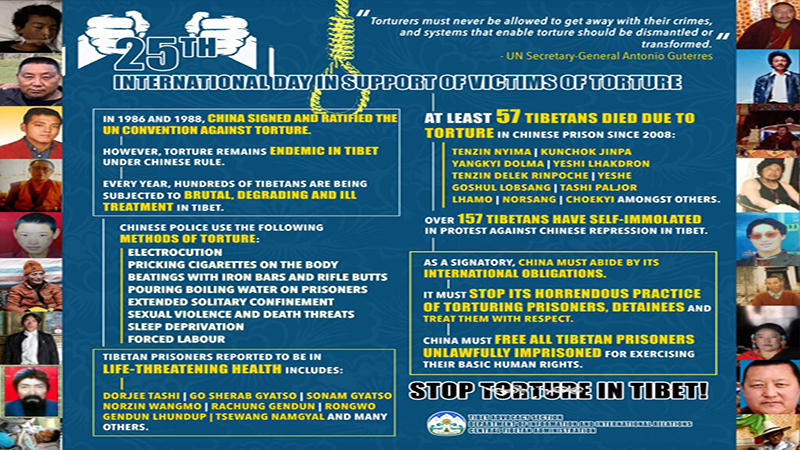Dharamshala, India – The Central Tibetan Administration and the Tibetan Center for Human Rights and Democracy call on the Chinese government to end torture in Tibet and release all Tibetan political prisoners, on the occasion of the 25th International Day in Support of Victims of Torture, June 26, 2023.
The Central Tibetan Administration (CTA) issued an urgent appeal to stop torture in Tibet, on the occasion of the 25th International Day in Support of Victims of Torture, from Dharamshala, HP,India, on June 26, 2023. CTA wrote,"Tibetans continue to languish in jail where Chinese authorities torture Tibetan prisoners of conscience, sometimes releasing them in near-death conditions. The CCP must stop torture in Tibet and release Tibetan political prisoners".
CTA explained about the United Nations Convention Against Torture and Other Cruel, Inhuman or Degrading Treatment or Punishment defines torture as “any act by which severe pain or suffering, whether physical or mental, is intentionally inflicted on a person” for obtaining information or a confession, or intimidation, etc.
"The Convention Against Torture (CAT) which entered into force on this day in 1987 lays out 19 Articles that States parties to this convention are obligated to abide by and uphold the Convention. China is one such state having signed the Convention in 1986 and ratified it in 1988. Therefore, China is obligated by the CAT to ensure the prevention and elimination of torture," the CTA stated.
The CTA, or Tibetan government in exile, while highlighting the condition of Tibetan political prisoners in Chinese jails, said, "Yet in Tibet – illegally occupied by China, torture is widespread and routinely used by the Chinese authorities against dissents. 26 June is therefore an opportunity to call on the Chinese Communist Party (CCP) to stop torture in Tibet. Tibetans continue to languish in jail where Chinese authorities torture Tibetan prisoners of conscience, sometimes releasing them in near-death conditions. The CCP must stop torture in Tibet and release Tibetan political prisoners".
The Tibetan Center for Human Rights and Democracy (TCHD) said,"On this occasion, we urge governments and citizens across the free world, including human rights organisations and independent agencies, to exert pressure on China to eliminate the practice of torture in all its forms. Having ratified the Convention in 1998, China must fulfil its obligations as a state party to the Convention".
TCHD said, while explaining the situation of Tibetan political prisoners in Tibet, "In 2022, TCHRD received information about the severe torture of a senior Tibetan monk in May 2013, part of China’s systematic practice to crack down on self-immolation protests, which began in 2009 and peaked in 2012 when 90 Tibetans self-immolated within a year to protest Chinese repression in Tibet. Severe beatings and torture were inflicted upon Tseta, a disciplinarian (Tib: ghe-gheu) at the local Adril monastery for merely capturing and disseminating a photograph of Sherab, a 33 years old Tibetan nomad who died of self-immolation in May 2013 in Chumarleb (Ch: Qumalai) County, Kyegu (Ch: Yushu) Tibetan Autonomous Prefecture, in the Tibetan province of Kham."
"Although information about Tseta emerged late, it attests to the fact that Chinese authorities have employed torture as a tool to suppress freedom of expression and assembly in a widespread and systematic manner. After the brutal crackdown on the 2008 Tibetan uprising and the subsequent ongoing manhunt to trace and track down the protesters, Tibetans have increasingly resorted to self-immolations as a form of political protest against Chinese policies. Crackdowns on self-immolation were brutal and expansive, affecting not just individual self-immolators but also their family and relatives," TCHD added.
"Likewise, the details of Dorje Tashi’s torture testimony, which became known only in 2021, provided further evidence that he was subjected to, sleep deprivation, poor diets, beatings with electric batons, prolonged stress positions, threats to harm his aged mother, and denial of medical care for four months all in an attempt to implicate him for non-existent political crimes," the Tibet human rights organisation said.
"The torture cases of Tseta and Tashi are not isolated incidents but examples of the various purposes for which Chinese authorities practice torture. It further demonstrates the institutionalisation of torture as a routine law enforcement and state security practices," they explained.
The Tibetan human rights organisation said, "Needless to say, the continuous and persistent reliance on torture methods undermines the fundamental tenets of the Convention. Hence, it is of utmost importance for the international community to call for an immediate cessation of all acts of torture against Tibetans in Tibet".


![Tibet has a rich history as a sovereign nation until the 1950s when it was invaded by China. [Photo: File]](/images/stories/Pics-2024/March/Tibet-Nation-1940s.jpg#joomlaImage://local-images/stories/Pics-2024/March/Tibet-Nation-1940s.jpg?width=1489&height=878)
















